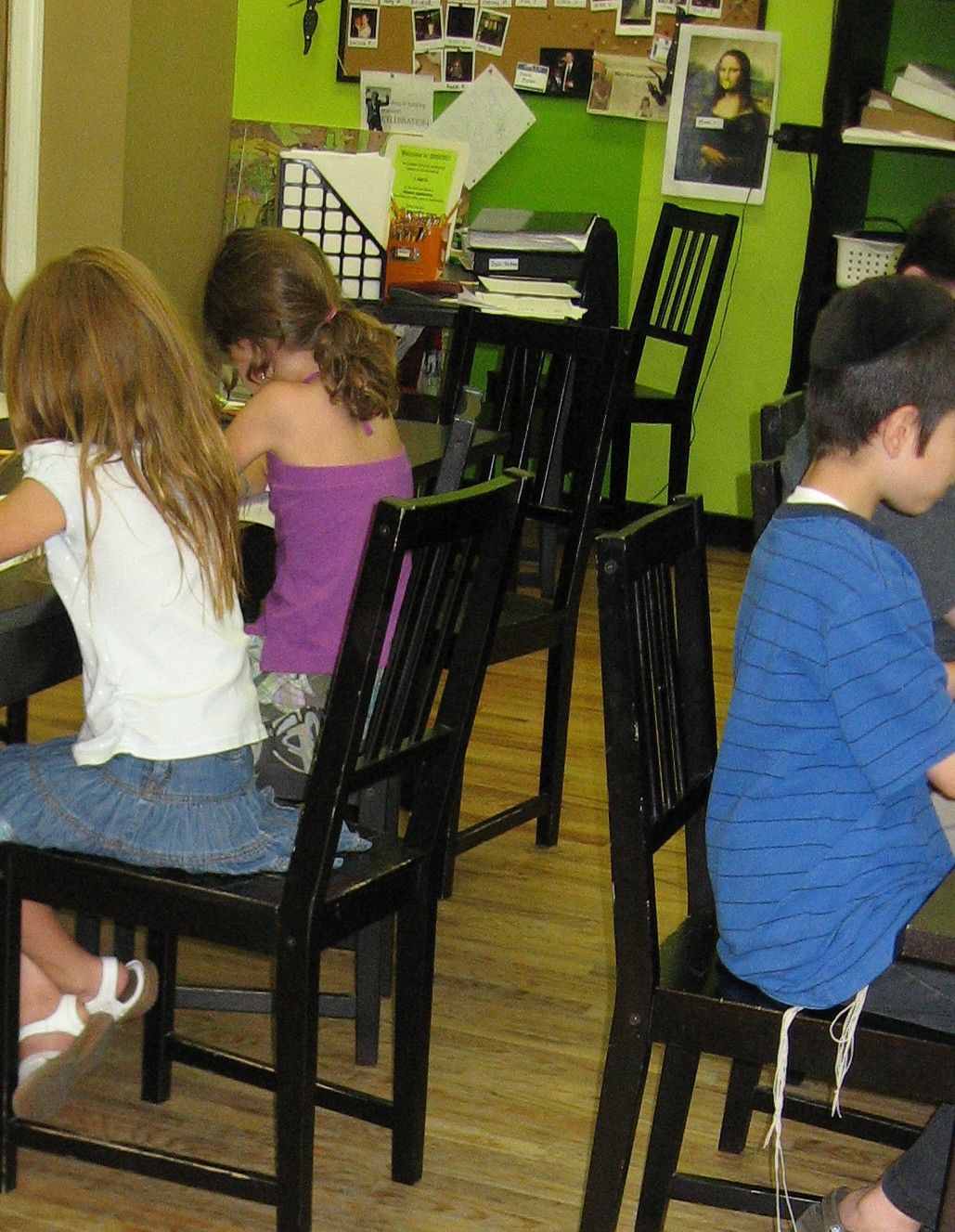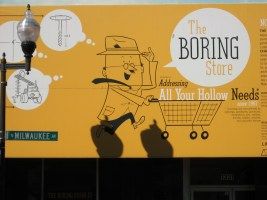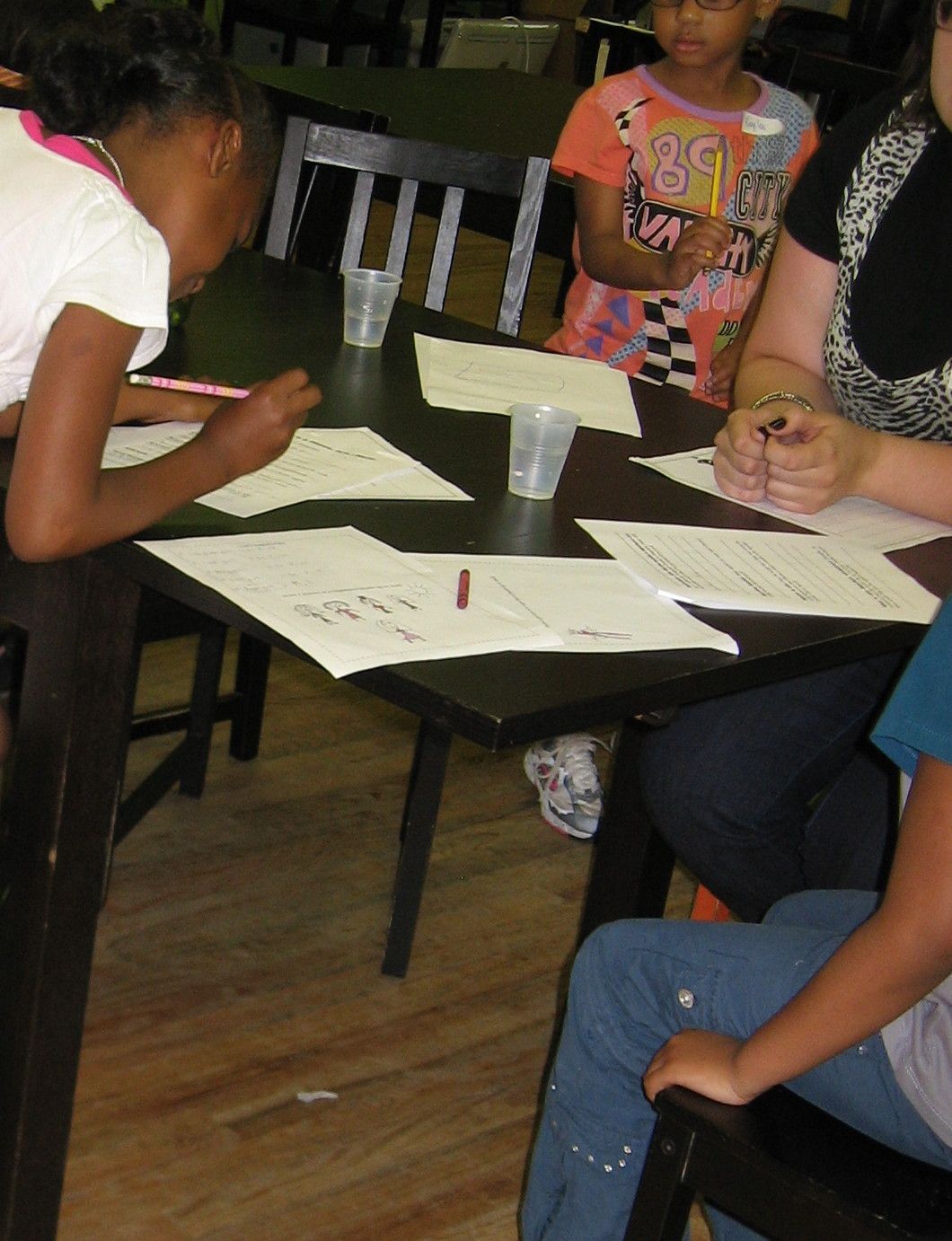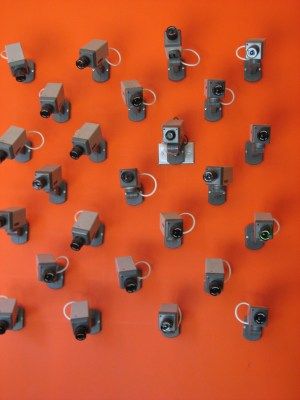


Photo: Rebecca Tirrell Talbot; Graphic design: Chris Ware
In Chicago, a glimmer of the world that ought to be, in our midst: Elementary-age kids chatter, laugh, and hunch over their latest writing projects, jotting down what they know about superheroes. Tutors admire their writing or ask prodding questions. My Morning Jacket plays in the background. Then, the kids circle on a carpet and do some very painless literary analysis. They deconstruct a genre with giggles and exclamations, eager to contribute, since the genre happens to be superhero tales. Once they’ve grasped the basic elements of the genre – sidekicks, villains, fatal flaws – they’re ready to create their own characters. Some are gleefully gross (these are elementary school kids, after all), like a boy named Antonio’s “Armpit Hair Man,” who swings to the rescue from (yup. cringe.you guessed it) his armpit hair.
“We’re academic, but we’re also fun and academic,” says 826 CHI‘s Executive Director, Mara O’Brien, whose enthusiasm and welcoming presence shape this chapter of the 826 National writing and tutoring centers. O’Brien greets each Elementary Writing Camp participant, calling out, “Hello, Sweet Jocelyn!” or “Welcome, my friend!” She believes that 826 CHI’s mission is not just to improve students’ language skills, but also to introduce them to a community of adults who care about them.
At this tutoring center, caring means encouraging creativity, and that usually means thinking like a kid. “We try to trick them into writing,” O’Brien admits. O’Brien once had elementary students write narratives about imaginary vacations – reminiscent of Magic School Bus adventures – through space, inside the human body, or through Harry Potter’s world. O’Brien says that this subject matter inspired elementary kids to write one and a half pages and to tell their parents they didn’t want to leave yet – they were still writing.
The world 826 CHI creates might not otherwiseexist for Chicago students.Presently, says a June 2009 report from the Civic Committee of The Commercial Club of Chicago, researched by the University of Illinois at Chicago, about half of the students who attend Chicago public schools drop out or fail to graduate on time. Just yesterday, I listened as a mother interviewed on NPR’s All Things Considered described Chicago’s selective enrollment schools as a “lifeboat” for students, implying how rough the ordinary school experience is. CPS has long been a troubled system, but it looks as if the state’s budget crisis will worsen its problems: the state board of education cut its budget by $180 million and slashed foreign language, arts, and agricultural programs.
Knowing the arts could be cut, three Americorps volunteers have been bringing West Garfield Park middle school boys to 826 CHI’s summer comics writing workshop. Yara Shadid, Gretchen Oorthuys, and Rachel Bernkopf marvel that the West Garfield Park kids are so creative, drawing on every flat surface and singing their own rap songs. Yet “their in-school time is very strict and regimented,” says Bernkopf. When the arts are cut in public schools, character development, originality, and the feeling of membership in the school all suffer, say the Americorps volunteers. Students will believe creativity has nothing to do with their future success.
Near where the kids circled to deconstruct superhero tales, a Chicago map shows the 157 schools that 826 CHI serves. This doesn’t just mean that kids from 157 schools are tutored at 826 CHI. It also means that teachers plan field trips to the center and that 826 CHI sends volunteers to Chicago public schools to provide extra one-on-one help. “We want to help area teachers get their students excited about writing,” says their website.

Tutors’ help is especially valuable because if any place can remove the perception that creativity is unimportant, it’s this place. After all, 826 National was begun by Dave Eggers, author of six books including What is the What and A Heartbreaking Work of Staggering Genius, and founder of McSweeney’s independent publishing house, which publishes McSweeney’s literary magazine, The Believer magazine, and Wholphin short-film DVDs.
At Chicago’s chapter, the advisory board reads like a who’s who of the local literary scene: Roger Ebert, Alex Kotlowitz, Audrey Niffeneger, Joe Meno, and many other well-known authors. These are people who’ve made their living being creative, and this is what their participation is about. For older kids, having contact with published authors who care about them must seem almost imaginary – as unreal as a superhero world. But this is the world that 826 CHI is able to create for students, and it is a reinforcing experience for would-be authors.
These connections to published authors also pave the way for young writers to see their own work in print.
Right in Front of Us is one recent example. Published in 2008, it was written entirely by CPS ninth-graders and edited by Alex Kotlowitz, author of There are No Children Here, Never a City So Real, and others. Reading the introduction, it’s easy to see Kotlowitz’s respect for these kids. “I picked up these stories one night,” wrote Kotlowitz, “sat down on my living room couch and didn’t rise until I was finished. I don’t know that I’ve read anything quite like this before.”
826 CHI keeps publishing student work. Most recently, 826 CHI published the first volume of their compendium, featuring work from students ranging from age 6 to 18. In 2007, 200 second through sixth graders wrote a hilarious guide to Chicago called A Sunday Afternoon Hotdog Meal. Publishing student work is an essential aspect of 826 National – which has also published the 826 Quarterly and sought student input for the Best American Non-required Reading anthologies.
At 826 CHI, kids join a circle where the arts have been crucial to success. Mara O’Brien says this shows the reality of what it is like to survive as a writer. Young writers see that even professional writers work many jobs to support themselves. Though earning success by your wits is hard work, 826 CHI is incredibly hip, and above all, the staff create an environment where it is cool to be academic.
Consider, for instance, that from the street, this doesn’t look like a tutoring center at all. Instead, the front of 826 CHI is The Boring Store, Chicago’s finest purveyor of secret agent supplies. When students come for tutoring, they pass through a portal that looks more like an art gallery than a store and sells such tongue-in-cheek items as a dropper-and-bottle called “Eve’s Dropper.”
The store has proved a good idea for many reasons. Not only does it sell quirky items and 826 National’s books, it takes away any stigma kids might feel about going to a “tutoring center.” It also brings in foot traffic. People wouldn’t walk off the street into “the place with all the tables,” says O’Brien, but they do come to The Boring Store, and this increases people’s familiarity with 826 CHI.
Though it’s been a benefit, Eggers didn’t plan it this way when he started 826 National. He simply wanted to start a tutoring center, but when he found the perfect place in the San Francisco Bay Area, the city told him, “That’s not zoned for tutoring; it’s zoned for retail.” As O’Brien tells it, Eggers replied, “Fine! I’m opening a pirate store.” And thus, Eggers began selling a whole lot of lard and tutoring centers came to be tucked into the backs of stores that sold anything you’d ever need for Space Travel, Bigfoot Research, Time Travel, or – of course – your secret job moonlighting as a superhero.
Places where creativity is free, rolicking, and communal may always be rare. But one such place exists at the corner of Milwaukee and Paulina here in Chicago, and it stands as a reminder of what ought to be – and a testimony to what can be.


